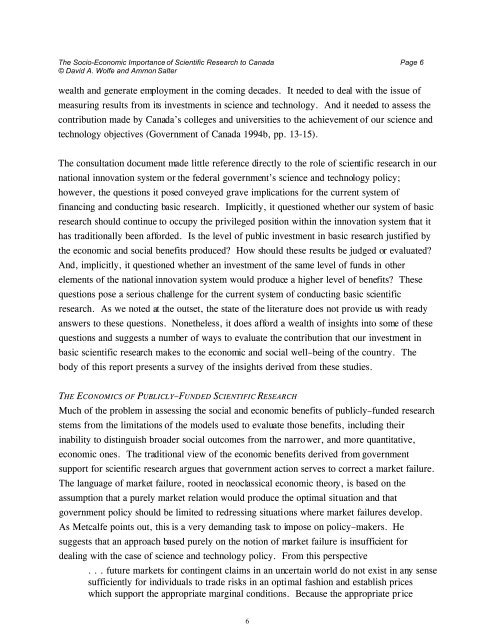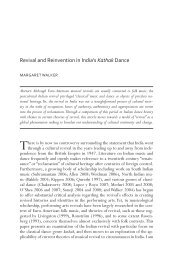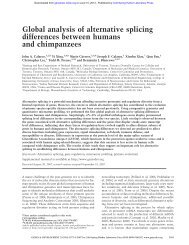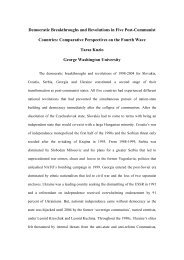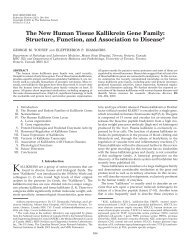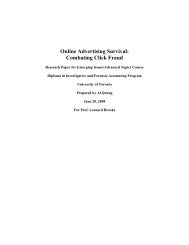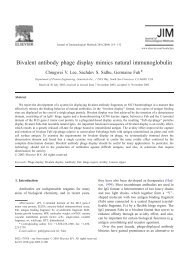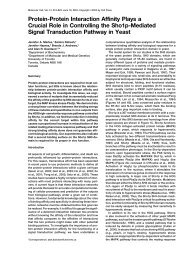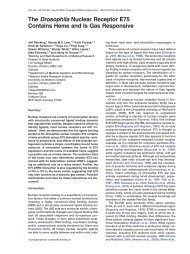The Socio-Economic Importance of Scientific Research To Canada
The Socio-Economic Importance of Scientific Research To Canada
The Socio-Economic Importance of Scientific Research To Canada
You also want an ePaper? Increase the reach of your titles
YUMPU automatically turns print PDFs into web optimized ePapers that Google loves.
<strong>The</strong> <strong>Socio</strong>-<strong>Economic</strong> <strong>Importance</strong> <strong>of</strong> <strong>Scientific</strong> <strong>Research</strong> to <strong>Canada</strong> Page 6© David A. Wolfe and Ammon Salterwealth and generate employment in the coming decades. It needed to deal with the issue <strong>of</strong>measuring results from its investments in science and technology. And it needed to assess thecontribution made by <strong>Canada</strong>’s colleges and universities to the achievement <strong>of</strong> our science andtechnology objectives (Government <strong>of</strong> <strong>Canada</strong> 1994b, pp. 13-15).<strong>The</strong> consultation document made little reference directly to the role <strong>of</strong> scientific research in ournational innovation system or the federal government’s science and technology policy;however, the questions it posed conveyed grave implications for the current system <strong>of</strong>financing and conducting basic research. Implicitly, it questioned whether our system <strong>of</strong> basicresearch should continue to occupy the privileged position within the innovation system that ithas traditionally been afforded. Is the level <strong>of</strong> public investment in basic research justified bythe economic and social benefits produced? How should these results be judged or evaluated?And, implicitly, it questioned whether an investment <strong>of</strong> the same level <strong>of</strong> funds in otherelements <strong>of</strong> the national innovation system would produce a higher level <strong>of</strong> benefits? <strong>The</strong>sequestions pose a serious challenge for the current system <strong>of</strong> conducting basic scientificresearch. As we noted at the outset, the state <strong>of</strong> the literature does not provide us with readyanswers to these questions. Nonetheless, it does afford a wealth <strong>of</strong> insights into some <strong>of</strong> thesequestions and suggests a number <strong>of</strong> ways to evaluate the contribution that our investment inbasic scientific research makes to the economic and social well–being <strong>of</strong> the country. <strong>The</strong>body <strong>of</strong> this report presents a survey <strong>of</strong> the insights derived from these studies.THE ECONOMICS OF PUBLICLY–FUNDED SCIENTIFIC RESEARCHMuch <strong>of</strong> the problem in assessing the social and economic benefits <strong>of</strong> publicly–funded researchstems from the limitations <strong>of</strong> the models used to evaluate those benefits, including theirinability to distinguish broader social outcomes from the narrower, and more quantitative,economic ones. <strong>The</strong> traditional view <strong>of</strong> the economic benefits derived from governmentsupport for scientific research argues that government action serves to correct a market failure.<strong>The</strong> language <strong>of</strong> market failure, rooted in neoclassical economic theory, is based on theassumption that a purely market relation would produce the optimal situation and thatgovernment policy should be limited to redressing situations where market failures develop.As Metcalfe points out, this is a very demanding task to impose on policy–makers. Hesuggests that an approach based purely on the notion <strong>of</strong> market failure is insufficient fordealing with the case <strong>of</strong> science and technology policy. From this perspective. . . future markets for contingent claims in an uncertain world do not exist in any sensesufficiently for individuals to trade risks in an optimal fashion and establish priceswhich support the appropriate marginal conditions. Because the appropriate price6


